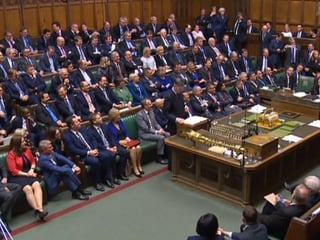General Election 2019: Why Tories’ attempt to demean SNP is backfiring – Helen Martin


GENERAL elections in the UK are often boring for many members of the public. It usually involves a battle between the Tory Party and Labour, who each take turns in winning, occasionally involving a semi-partnership with Lib Dems, or recently the DUP.
It’s been simply about who runs the United Kingdom. When we all got fed up with several terms of one party, the other was voted to take over. British politics worked like a see-saw.
Advertisement
Hide AdAdvertisement
Hide AdI even heard a Sky news reporter describing this election as “binary”, which is what it’s been in the past, but certainly isn’t now.
On December 12, we won’t be voting for one party or the other to manage the UK. We are voting to accept Brexit or revoke it, having a People’s Vote to decide or leaving it up to Parliament, protecting the Union or Scotland leaving it, accepting the current Brexit deal on offer or amending it to maintain a customs union or single market.
This time it’s not about merely voting for our usual party, it’s a far more complex vote to consider, and quite possible that no single party offers all the options we want delivered.
One of the biggest challenges for voters is learning facts. Many politicians lie or avoid the truth. Many spend every moment on their feet in the House of Commons, simply criticising the opposition rather than discussing and reasonably debating issues.
Advertisement
Hide AdAdvertisement
Hide AdSo complicated is the current situation that political strategies can backfire and entirely confuse the public.
Take independence as an example. Some Westminster politicians are determined the Union stays together, as are some voters both in the UK and Scotland. But how would UK politicians try to achieve such a thing? Logically they would praise, admire and appreciate Scotland, regard it as a valuable partner, negotiate respectfully and persuade it by offering political and economic reasons to remain in the UK. That would explain why it wants to keep a United Kingdom and might win over more Scottish voters.
Boosting independence support
That’s not the way the Conservatives work. Attack, boo, criticise and walk out when a member of the third largest party in the House with the majority of Scottish MPs stands to speak, seems a strange way to build on unity. It’s even worse than the way Tory and Labour leaders deal with each other.
Many seem to believe a powerful, demeaning criticism is a winning, dismissive tactic. They don’t seem to realise that’s a strategy which boosts Scottish national support and doesn’t explain why they want to keep Scotland in the Union. For many in Scotland, independence and staying in the EU are seen as the most important results of this election. For others it’s about staying in the UK. The DUP wants to be in the Union but is being edged out. Wales has its own issues, including growing independence. That’s what happens in a Union of countries. We’re all voting for different things.
Advertisement
Hide AdAdvertisement
Hide AdAnother complexity is televised general election debates. All parties may be and should be represented, but already there are interviews, opinions and mini studio debates in which only Tory and Labour voices are featured. Sometimes Lib Dems are included because they can also be elected in England. But this is a UK election, so how fair is that for people in Wales, Scotland and Northern Ireland? Leaving out their Westminster representatives can fuel resentment from non-English viewers in the current, political situation.
In the past we could vote for a party politician in a general election and a different party MSP in the Scottish election. That’s not the case for December 12.
